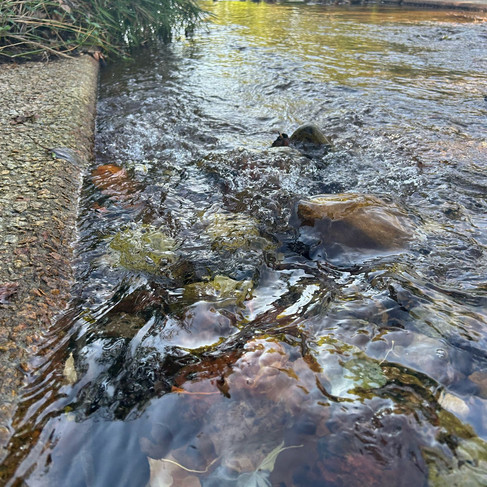Don’t Go Chasing Waterfalls But Instead Reimagine the Rivers You Know
- mtbersagelbraley
- May 16, 2025
- 2 min read
By Izabella Britten (Ethics, Culture, and Society; Spanish ’27)
On our second full day in Cape Town we took part in a few very important and relevant discussions. One of them being a walk and talk with Craig Stewart along the Liesbeek River. Upon first impression the river did not seem quite like a river, more of a creek. However, Craig explained the history of the river and how it got to be how it was today. Now so long ago in its history it was viewed more as a canal, and it was enclosed in cement and not viewed as a “river.” This idea led to a few mind-boggling inquiries as to what is a river? And what is its purpose? As one naturally does we imposed our beliefs about rivers based on what we know of the Mississippi River onto this river, which as we are learning on this trip does not always apply.
Somehow, in the process of learning about the river and attempting to define exactly what a river was, the discussion turned into one of social justice, social imagination and reimagining society within the limits we have built around ourselves. The river at one time just being concrete slabs and water, viewed as solely a passageway for water to flow from one place to the next. However, now, although the concrete structures still exist, there is vegetation, rocks, and life to the river. But to get it to this point there was a lot of resistance and work that was put into it. We discussed a lot with Craig – from his work with the river to his childhood in South Africa. He brought a lot of good perspectives and gave us some very interesting insights about life in South Africa and the racial dynamics that are still extremely prevalent to this day.
As an Ethics, Culture, and Society (ECAS) major, I really appreciated the interdisciplinary ideas and perspectives that this conversation brought forth. Starting with a discussion about biology and simple definitions turned into a major deep dive into societal behavior and expectations. Thinking deeper about the river, one can see how it is persevering within the concrete wall in which it is forced to exist. However, it leads one to wonder what would have happened if the concrete barriers would have been removed completely? To have started over or revolutionize the river? Would it have succeeded? Or would it have failed miserably? Would people have been willing to let go that much control towards our natural resources? How does the unwillingness to let go of existing structures reflect on South African society or our global society as a whole? What consequences would occur if a whole reconstruction would have taken place? What consequences would have occurred if nothing would have happened to the river at all?
This simple walk and talk brought forth a lot of ideas and things to reflect on. I definitely have not processed all of it yet. But I certainly very much enjoyed Craig’s perspective and him sharing the work he has done in his community. I definitely learned today that one does not need to go chasing after some grand dream or idea elsewhere but instead reimagine and recreate using what you already have.











Comments